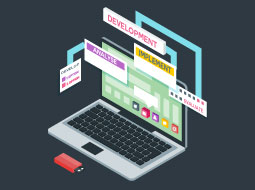Online courses directory (212)
How have advances in genetics affected society? What do we need to know to make ethical decisions about genetic technologies? This course includes the study of cloning, genetic enhancement, and ownership of genetic information. Course participants will acquire the tools to explore the ethics of modern genetics and learn how to integrate these issues into their classrooms.
Geography is the study of the physical features of the Earth and its atmosphere including landscape development, weather and climate, and geologic concepts as well as the influence of human activity including cultural, economic, and political activity on those physical features. Geography students, as they study the many aspects of our physically and culturally diverse world, tend to become more adept at tasks that require both spatial and critical thinking skills. World Regional Geography covers the basic elements noted above but within a regional context. Ultimately, World Regional Geography is concerned with the physical and human characteristics that make the regions of our world distinctive. As you progress through the course, the units will discuss each major world region in detail, placing particular emphasis on cultural and societal structures. Regions will be discussed within a global framework in the hope that you will gain a better comprehension of how the world map is being defined a…
This course is designed to examine an array of issues related to the globalization of higher education and research. The main objective of the course is to enable students to better understand how and why universities are engaged in the globalization process, as well as what the key implications of this development process are.
For parents and teachers. Learn about the many ways you can coach children to make/save money and become entrepreneurs.
Students want to know their instructor. This challenges online faculty to integrate technologies, such as avatars, video, and social media, to introduce their digital personalities and enhance learners’ experiences. This is called “humanizing,” which, according to DuCharme-Hansen, Dupin-Bryant, 2005 “reduces the psychological distance between the students and the instructor.” As online learning initiatives continue to expand, so does the need to leverage new learning technology to ensure students feel connected and engaged with the instructor and the course material. Course Objectives: Learn how to integrate educational technology tools into an online course with an emphasis on technology that can create an instructor presence or increase personal interaction. Share insights and suggestions about how to “humanize” online courses by maximizing the use of flexible educational technology tools. Demonstrate how technology-facilitated interactions can make instructors and learners more "real" online and how this correlates with student learning and retention. DuCharme-Hanson, R. and Dupin-Bryant, P. (2005). Course Planning for Online Adult Learners. Tech Trends March/April 49 (2), 31-39.
Are you an educator? Double your impact by taking advantage of both the classroom and online environments. Explore methods to effectively combine the two formats and build a class community that engages students and supports active learning in any subject area. For educators both new and experienced. To receive a certificate of completion from the instructor the students must complete one of two options for the final project.
Why and how are teachers integrating ICT (Information and Communication Technology) into primary education? In this course we analyse examples from schools in different parts of the world, and bring professional teachers, headteachers and policymakers together to share their best ideas and inspiring stories. The materials in the course are based on studies carried out for the UNESCO Institute of IT in Education, Moscow.
Voxopop is a Web application program that can be used by teachers and trainers as an online learning tool to create forums where questions are asked using voice recordings instead of text. It can be used to help students develop their oral speaking skills by having students reply to questions using voice recorded answers and by hearing the recorded answers from other students. This online language learning tool is particularly useful in language teaching, where a teacher can post a question in the language they are teaching and have students respond orally to the question in the same language. In this free online language learning course about Voxopop you will learn how to join and use Voxopop, create talk-groups and initiate discussion forums to get people discussing a topic, and how to be notified when someone responds. This free language learning course will be of great interest to teachers and trainers who would like to see how this Web application program can help them improve the oral skills of their students especially in relation to language teaching.<br />
French is spoken by 110 million native speakers, is an official language in 29 countries and has 190 million non-native speakers around the world. This free online course is ideal for learners who have had some exposure to the French language and want to continue improving their knowledge and understanding of both grammar and vocabulary of this wonderful language. You will start this free course by improving your pronunciation skills. This is followed by learning more useful vocabulary and further expanding your ability to count numbers in French. You will also improve your understanding and knowledge of grammar rules, in particular, the use of adjectives, adverbs and pronouns. This course will be of interest to business professionals doing business in French speaking countries and who would like to communicate more effectively with their French speaking colleagues, and to individual students learning French who would like to continue improving their understanding of this language.<br />
Este curso promueve el conocimiento de los recursos educativos abiertos y su integración en el movimiento educativo abierto, como una oportunidad para innovar en los procesos formativos a través de prácticas docentes innovadoras.
In this course, teachers will develop the skills essential to move from a top-down content delivery model of science instruction to one in which the teacher is a guide, enabling students to create shared meaning of important science concepts.
This is the first in a series of four courses; each addressing a different set of skills science educators need to meet the demands of their career. In this course, teachers will engage in experiences designed to develop the skills needed to be a leader on their campus and to promote and enhance science learning in spheres outside their classroom.
This is the second in a series of four courses; each addressing a different set of skills science educators need to meet the demands of their career. In this course, teachers will engage in experiences designed to develop the skills needed to create a more powerful science learning environment in their classroom.
This is the third in a series of four courses; each addressing a different set of skills science educators need to meet the demands of their career. In this course, teachers will develop a deeper understanding of several broad topics in the major science content areas by examining common misconceptions.
This course introduces participants to instructional design principles for teaching with mobile technology. Participants will also have the opportunity to attend virtual events facilitated by mobile learning designers and practitioners.
The Cloud Institute’s Education for Sustainability (EfS) online course is designed to increase participants’ awareness, knowledge, and understanding of the core concepts, content, and habits of mind that characterize Sustainability and Education for Sustainability (EfS). This online learning community has been designed to provide a foundation in EfS, and the six-week course engages participants in activities that combine systems thinking, sustainable economics, and the science of sustainability, and is open to anyone interested in gaining awareness and new ways of thinking about prosperity, responsible citizenship, and the restoration of our living systems. Course content will be delivered via video, podcasts and handouts – and we will host 3 live chats with Jaimie Cloud. We have optional recommended resources in the form of access to our online portal Cloud Commons. The fee is $39 for a six week subscription to the EfS Content Library of Cloud Institute units and lessons, templates, assessment protocols, enduring understandings, and workshop materials.
Instructional Systems Design is the process of designing and developing instructional courses or materials that bring greater efficiency and effectiveness to acquiring knowledge or skills for learners. This free online course in Instructional Systems Design reviews important aspects such as learning theories and learning objectives and how they influence the design process. It also reviews the role of memory, needs analysis, and design models such as ADDIE (Analysis, Design, Development, Implementation, and Evaluation). Robert Gagne's Nine Events of Instruction are also discussed with examples of their application and use. Finally, learning technologies and how they are used to deliver training are reviewed, as well as techniques for measuring and evaluating the effectiveness of the instructional materials. This course will be of great interest to all human resources, teaching and training professionals who are involved in training, instructional design and e-learning, and who would like to learn more about important aspects of instructional systems design and their use and application in designing and developing highly effective instructional materials or courses.<br />
Introduction to Openness in Education provides a broad overview of the ways in which openness impacts many areas of education
For teachers and trainers to fulfil their instructional role most effectively, their teaching methods must be grounded in educational learning theory. Understanding the learning process is a key element of educational learning theory and provides a framework for teachers and trainers to plan, create and deliver effective lessons, and assess each student's learning. In this free online education course, you will be introduced to the learning process. The course begins by differentiating between teaching and learning, and by describing teachers’ and trainers’ perspectives on learning. The course provides details about two major learning theories: behaviourism and constructivism. Within the section on Behaviourism, operant conditioning and its implications for teaching are examined in detail. The section on Constructivism compares and contrasts two subtypes of constructivism: psychological constructivism and social constructivism. Finally, the implications of constructivism for teaching are discussed using two practical strategies. This free online education course will be of great interest to professionals in the education sector who would like a greater knowledge and understanding of the learning process that will enhance their teaching and training, and to all students who are interested in the process of how we learn.<br />
Sixth-grade Language Arts marks a turning point for you in your academic career. After developing and practicing the skills necessary to develop a strong foundation for your success at the elementary level, you are now ready to embark on the next step in your journey as a reader and writer. Based on the Common Core State Standards, this course will help you grow as a reader and writer of both literary and informational text. You will read a number of complex, thematically related narratives, short stories, extended informational texts, and nonfiction articles. You will learn to analyze these varied texts, to identify key ideas and details, to compare and contrast major text elements, and to distinguish between those claims supported by evidence and those that are not. You will then try your hand at writing your own arguments and supporting them with research-based evidence, and you will work to improve your writing by taking it through the steps of the writing process. In your own life, these reading and wr…
Trusted paper writing service WriteMyPaper.Today will write the papers of any difficulty.




















